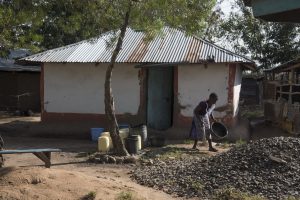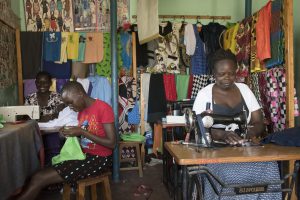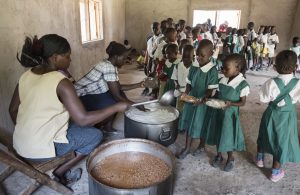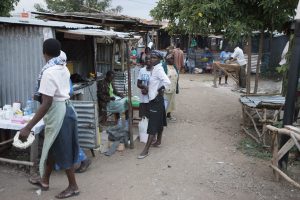Pap-Onditi is a small rural village in western Kenya near the shores of Lake Victoria. It is the home of I-KODI’s founder, Daniel Ochiel.
Here, children begin their day before the sun rises.
They work to care for younger siblings and tend livestock. After doing chores, they make their way to school, following dusty foot trails that cut between small cinderblock homes with tin r oofs.
oofs.
Mothers look after infants, build small cooking fires and tidy-up. In quiet moments they worry about where the next meal will come from, and whether there is enough money to pay for school fees.
Down the road in the village, things are coming to life.
 Vendors open stalls selling kerosene or used clothing or inexpensive household goods. There is a blacksmith in town, a hair salon and a small restaurant. Women set up roadside displays of vegetables, while seamstresses feed brightly patterned fabric into pedal-powered sewing machines.
Vendors open stalls selling kerosene or used clothing or inexpensive household goods. There is a blacksmith in town, a hair salon and a small restaurant. Women set up roadside displays of vegetables, while seamstresses feed brightly patterned fabric into pedal-powered sewing machines.
Most mornings, carpenters ready themselves for a busy day ahead. They make one of the most needed commodities in the village- not tables or chairs, but coffins.
HIV/AIDS takes a heavy toll on families here, as do many of the ancient plagues- malaria, TB, and cholera. Children struggle against malnutrition and debilitating diarrheal illness. Many do not live long enough to celebrate their 5th birthday.
Up the road the hospital is running efficiently under the guidance of Dr. Albert, but it too is often filled to capacity and he worries about the spread of multi-drug resistant TB in the closely packed treatment rooms.

By noon, children at the Konditi Primary School begin lining up for their lunchtime meal. They wash their hands in a basin of clean water and take a tin plate from the pile.
They wait in line to receive a generous helping of food, most often it is maize and beans. For some, this will be the only meal they receive during the day.
Others leave school in the middle to the day, sent home in search of money to pay the fees that will allow them to come back to class. Often they don’t return.

Teachers gather in the library to chat, grade papers and drink tea. They correct lessons written on homemade notebooks of scrap paper held between two cardboard covers.
Each day they arrive early and stay late. They teach English, math, science and history lessons on worn and pitted chalkboards. For their efforts, they are paid a meager wage.
At day’s end, children stream out of the classrooms, running, laughing and calling to each other. There are no after school programs here, no soccer balls, no clubs to attend. They make their way home in a hurry. They have chores to do and, if they are lucky, they can catch the fading light to read or study.
 Twilight brings renewed activity at the market, as mothers shop for food and neighbors greet each other. Vendors are cut short by the fading light and make due with small kerosene lamps or simply close down for the evening.
Twilight brings renewed activity at the market, as mothers shop for food and neighbors greet each other. Vendors are cut short by the fading light and make due with small kerosene lamps or simply close down for the evening.
There is no electricity in most homes. For some, small kerosene flames provide light needed to wash dishes, tend to the baby, or study.
For many others the darkness is complete. There is nothing more to be done but to sleep and wait for a new day to begin.
Life moves to steady rhythms here, unfolding to reveal the struggles and the resilience needed to survive. But there is a deep sense of community and pride of place here. A human connection that is often missing in our world today.
